将定语从句转换为简单句
定语从句转译法
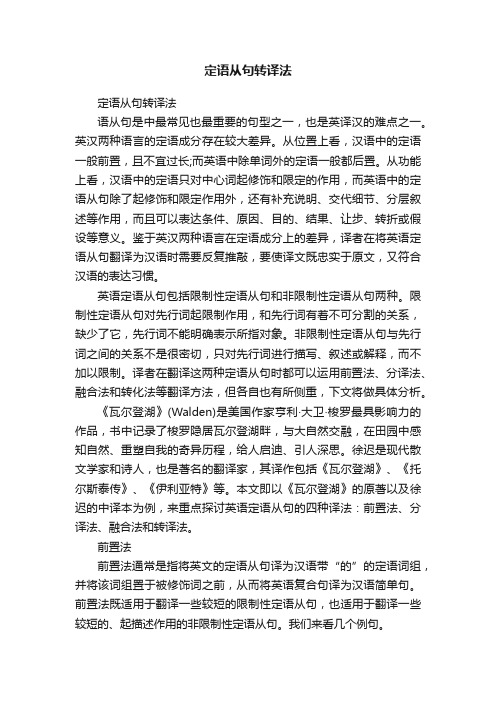
定语从句转译法定语从句转译法语从句是中最常见也最重要的句型之一,也是英译汉的难点之一。
英汉两种语言的定语成分存在较大差异。
从位置上看,汉语中的定语一般前置,且不宜过长;而英语中除单词外的定语一般都后置。
从功能上看,汉语中的定语只对中心词起修饰和限定的作用,而英语中的定语从句除了起修饰和限定作用外,还有补充说明、交代细节、分层叙述等作用,而且可以表达条件、原因、目的、结果、让步、转折或假设等意义。
鉴于英汉两种语言在定语成分上的差异,译者在将英语定语从句翻译为汉语时需要反复推敲,要使译文既忠实于原文,又符合汉语的表达习惯。
英语定语从句包括限制性定语从句和非限制性定语从句两种。
限制性定语从句对先行词起限制作用,和先行词有着不可分割的关系,缺少了它,先行词不能明确表示所指对象。
非限制性定语从句与先行词之间的关系不是很密切,只对先行词进行描写、叙述或解释,而不加以限制。
译者在翻译这两种定语从句时都可以运用前置法、分译法、融合法和转化法等翻译方法,但各自也有所侧重,下文将做具体分析。
《瓦尔登湖》(Walden)是美国作家亨利·大卫·梭罗最具影响力的作品,书中记录了梭罗隐居瓦尔登湖畔,与大自然交融,在田园中感知自然、重塑自我的奇异历程,给人启迪、引人深思。
徐迟是现代散文学家和诗人,也是著名的翻译家,其译作包括《瓦尔登湖》、《托尔斯泰传》、《伊利亚特》等。
本文即以《瓦尔登湖》的原著以及徐迟的中译本为例,来重点探讨英语定语从句的四种译法:前置法、分译法、融合法和转译法。
前置法前置法通常是指将英文的定语从句译为汉语带“的”的定语词组,并将该词组置于被修饰词之前,从而将英语复合句译为汉语简单句。
前置法既适用于翻译一些较短的限制性定语从句,也适用于翻译一些较短的、起描述作用的非限制性定语从句。
我们来看几个例句。
例1:When I wrote the following pages, or rather the bulk of them,I lived alone,in the woods, a mile from any neighbor, in a house which I had built myself, on the shore of Walden Pond,in Concord,Massachusetts,and earned my living by the labor of my hands only.译文当我写后面那些篇页,或者后面那一大堆文字的时候,我是在孤独地生活着,在森林中,在马萨诸塞州的康科德城,瓦尔登湖的湖岸上,在我亲手建筑的木屋里,距离任何邻居一英里,只靠着我双手劳动,养活我自己。
将定语从句转换为简单句

将定语从句转换为简单句man who you’re talking to is my friend.need a pen with which I can write a letter.man (whom) I talked about at the meeting is from Beijing University.live in a house far away from the city, in front of which is a big tree.engineer, whose leg was badly hurt, was quickly sent to hospital.you know the gentleman who/that is sitting thereman (whom ) I spoke with is my teacher.is the right girl (whom) we are looking for.house which/that was destroyed in the earthquake is weak.games (that/which) the young men competed in were difficult.11. I still remember the time when I joined the League.still remember the school in which=where I joined the League.is the factory (which/that) he visited yesterday.reason why(for which) he was late is that he missed the bus.is the reason (that/ which) he gave/ explained to us.will never forget the day (which/that) I spent in Hongkong.will never forget the day when/on which Hongkong returned to its motherland.reason (that/which)he gave for not coming to school yesterday isn’t believable.is the best film that has been shown this year.is the first book (that) I borrow from the library.is the first student that/who came to school today.talked about the teachers and the school (that) he had visited.that I want to say to you is “Thank you”.’ll tell you anything (that) I know.is one of the books (that) I’m very intis the only book (that) I read.is the only one of the boys that likes playing the piano.the glasses that were on the table fell off onto the floor.likes the girl(充当表语) that she used to be.room in which he lives is very large.house, which I visited yesterday,is very large.。
in which定语从句改写回
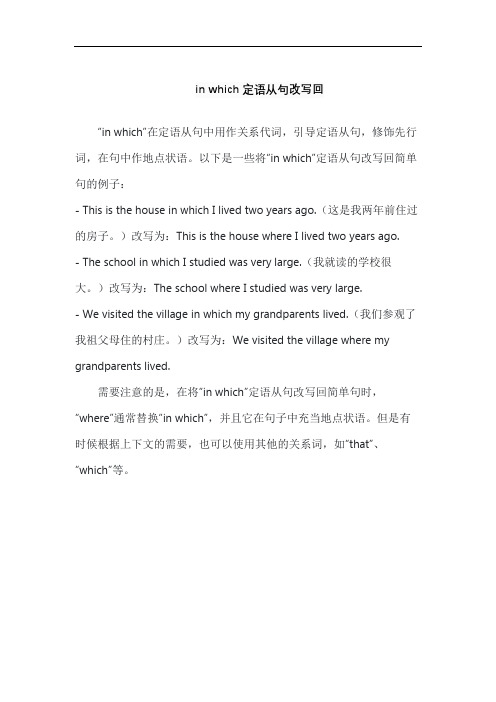
in which定语从句改写回
“in which”在定语从句中用作关系代词,引导定语从句,修饰先行词,在句中作地点状语。
以下是一些将“in which”定语从句改写回简单句的例子:
- This is the house in which I lived two years ago.(这是我两年前住过的房子。
)改写为:This is the house where I lived two years ago. - The school in which I studied was very large.(我就读的学校很大。
)改写为:The school where I studied was very large.
- We visited the village in which my grandparents lived.(我们参观了我祖父母住的村庄。
)改写为:We visited the village where my grandparents lived.
需要注意的是,在将“in which”定语从句改写回简单句时,“where”通常替换“in which”,并且它在句子中充当地点状语。
但是有时候根据上下文的需要,也可以使用其他的关系词,如“that”、“which”等。
复合句改为简单句
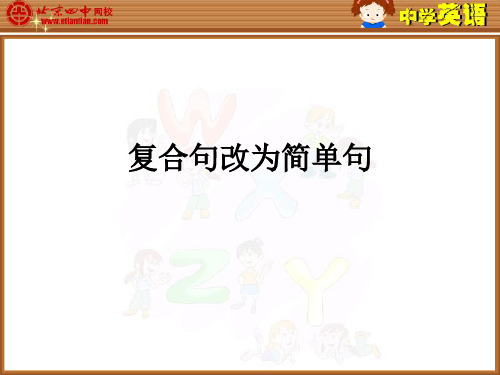
三、将定语从句变为简单句 (提高部分)
1)当定语从句是主动语态并且用的是进行时态时, 可将定语从句改为现在分词短语;当定语从句中 的谓语动词是表示经常性的动作时,可将定语从 句改为现在分词短语。如: The man who is talking with Mary is my brother. talking with →The man _____ _____Mary is my brother. A chemist’s shop is a shop which sells medicine. medicine →A chemist’s shop is a shop selling _____ _____.
2) 含有so …that …引导的结果状语从句(肯定)的复合句 用“…enough +不定式”结构可以将变为简单句。例如: 1. The girl is so tall that she can reach the apples on the tree. tall enough to reach →The girl is _____ _____ _____ _____the apples on the tree. 2.This hall is so large that it can hold 2000 people. to _____ hold 2000 people. →This hall is large enough _____ _____ 3. The table was so light that the little boy can carry it. light _____ enough for the little boy _____ →The table was _____ _____ to carry.
复合句与简单句的转换技巧

复合句与简单句的转换技巧一、含宾语从句的复合句转换为简单句即将宾语从句转换成相应的短语。
如:We expected that you would come. 我们希望你来。
→We expected you to come. 我们希望你来。
Now tell me what I should do. 现在告诉我该怎么办。
→Now tell me what to do. 现在告诉我该怎么办。
I remember I once met her at a party. 我记得在一次晚会上见过他。
→I remember once meeting her at a party. 我记得在一次晚会上见过他。
I ask him what I shall do. 我问他该怎么办。
→I ask him what to do. 我问他该怎么办。
I can’t decide whom I shou ld invite. 我不能决定该邀请谁。
→I can’t decide whom to invite. 我不能决定该邀请谁。
二、含状语从句的复合句转换成简单句即将状语从句转换成状语短语。
如:He can’t come because he is ill. 他因病不能来。
→He can’t come because of his illness. 他因病不能来。
Turn off the light before you leave. 离开前请关灯。
→Turn off the light before leaving. 离开前请关灯。
He went home after he finished his work. 他做完工作后就回家了。
→He went home after finishing his work. 他做完工作后就回家了。
He was so angry that h e couldn’t speak. 他气得话都说不出来。
定语从句改写为简单句

(一)改用“不定式〞或“不定式短语〞如果定语从句的时态与主句的时态具有同时性(包括谓语有情态动词)或之后性,那么可以用“关系代词或关系副词+不定式〞来简化,或直接用“不定式〞来修饰先行词。
要注意的是,此时的不定式一定要是及物动词,如果是不及物,那么需要在动词后面加上相应的介词,使之成为及物动词短语。
这个结尾的介词可以提前到关系代词前面,也可以继续留在句尾。
前者是正式说法,后者是非正式说法。
例1:We moved to the country so that the children would have a garden in which they could play in.我们搬到了乡下,好让孩子们有个花园在里面玩。
改为:We moved to the country so that the children would have a garden in which to play.或者:We moved to the country so that the children would have a garden to play in.例2:He felt miserable unless he had neighbors (whom)he could quarrel with.他要是没有可以吵架的邻居就难受。
改为:He felt miserable unless he had neighbors with whom to quarrel.或者:He felt miserable unless he had neighbors to quarrel with.例3: The conference which will be held this afternoon is bound to be a great success. 方案在今天下午举行的会议一定会取得成功。
改为:The conference which to be held this afternoon is bound to be a great success.或者:The conference to be held this afternoon is bound to be a great success.12月29日,美国邮政总局局长约翰·E·波特在檀香山从句了农历新年的纪念邮票小型张的揭幕仪式,这枚小型张将于2005年正式发行,它为农历新年的系列纪念邮票写下了完美的结局。
将下列带定语从句的主从复合句变为简单句
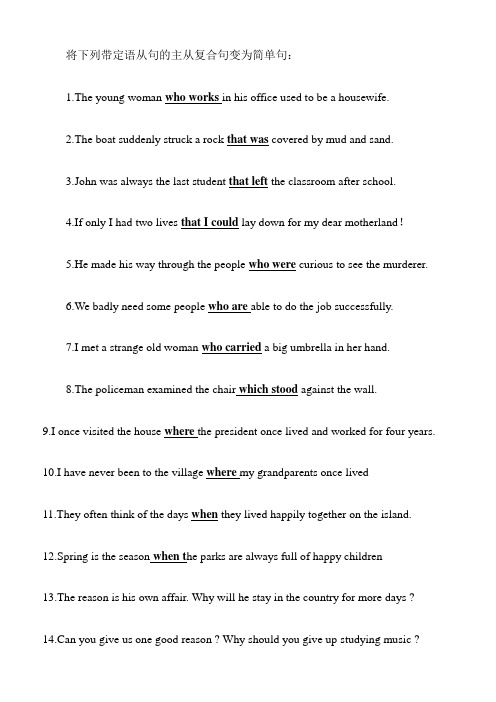
将下列带定语从句的主从复合句变为简单句:1.The young woman who works in his office used to be a housewife.2.The boat suddenly struck a rock that was covered by mud and sand.3.John was always the last student that left the classroom after school.4.If only I had two lives that I could lay down for my dear motherland!5.He made his way through the people who were curious to see the murderer.6.We badly need some people who are able to do the job successfully.7.I met a strange old woman who carried a big umbrella in her hand.8.The policeman examined the chair which stood against the wall.9.I once visited the house where the president once lived and worked for four years.10.I have never been to the village where my grandparents once lived11.They often think of the days when they lived happily together on the island.12.Spring is the season when t he parks are always full of happy children13.The reason is his own affair. Why will he stay in the country for more days ?14.Can you give us one good reason ? Why should you give up studying music ?1.The young woman working in his office used to be a housewife.2.The boat suddenly struck a rock covered by mud and sand.3.John was always the last student to leave the classroom after school.4.If only I had two lives to lay down for my dear motherland!5.He made his way through the people curious to see the murderer.6.We badly need some people able to do the job successfully.7.I met a strange old womanwith a big umbrella in her hand.8.The policeman examined the chair against the wall.9.I once visited the house . The president once lived and worked in the house for four years. 10.I have never been to the village. My grandparents once lived in the village.11.They often think of the days. They lived happily together on the island in those days.12.Spring is the season. The parks are always full of happy children in the season.13.The reason why he will stayin the country for more daysis his own affair.14. Can you give us one good reason why you should give up studying music ?。
仁爱中考定语定语从句
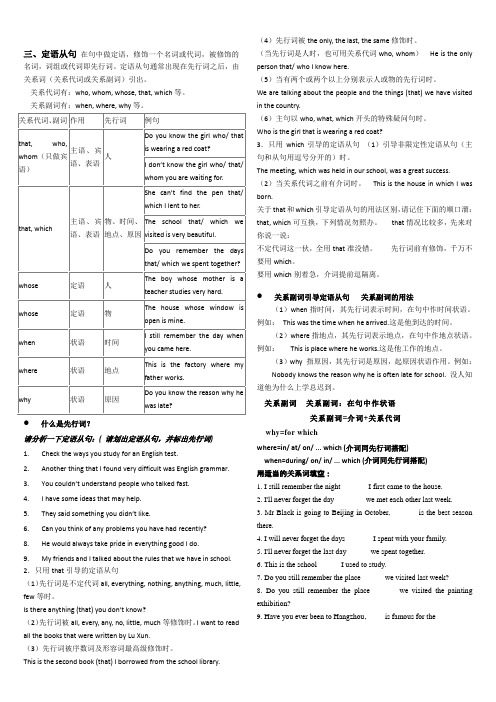
三、定语从句在句中做定语,修饰一个名词或代词,被修饰的名词,词组或代词即先行词。
定语从句通常出现在先行词之后,由关系词(关系代词或关系副词)引出。
关系代词有:who, whom, whose, that, which等。
关系副词有:when, where, why等。
●什么是先行词?请分析一下定语从句:( 请划出定语从句,并标出先行词)1. Check the ways you study for an English test.2. Another thing that I found very difficult was English grammar.3. You couldn’t understand people who talked fast.4. I have some ideas that may help.5. They said something you didn’t like.6. Can you think of any problems you have had recently?8. He would always take pride in everything good I do.9. My friends and I talked about the rules that we have in school. 2.只用that引导的定语从句(1)先行词是不定代词all, everything, nothing, anything, much, little, few等时。
Is there anything (that) you don’t know?(2)先行词被all, every, any, no, little, much等修饰时。
I want to read all the books that were written by Lu Xun.(3)先行词被序数词及形容词最高级修饰时。
- 1、下载文档前请自行甄别文档内容的完整性,平台不提供额外的编辑、内容补充、找答案等附加服务。
- 2、"仅部分预览"的文档,不可在线预览部分如存在完整性等问题,可反馈申请退款(可完整预览的文档不适用该条件!)。
- 3、如文档侵犯您的权益,请联系客服反馈,我们会尽快为您处理(人工客服工作时间:9:00-18:30)。
将定语从句转换为简单句
man who you’re talking to is my friend.
need a pen with which I can write a letter.
man (whom) I talked about at the meeting is from Beijing University. live in a house far away from the city,in front of which is a big tree. engineer,whose leg was badly hurt,was quickly sent to hospital. you know the gentleman who/that is sitting there
man (whom ) I spoke with is my teacher.
is the right girl (whom) we are looking for.
house which/that was destroyed in the earthquake is weak.
games (that/which) the young men competed in were difficult.
11.I still remember the time when I joined the League.
still remember the school in which=where I joined the League.
is the factory (which/that) he visited yesterday.
reason why(for which) he was late is that he missed the bus.
is the reason (that/ which) he gave/ explained to us.
will never forget the day (which/that) I spent in Hongkong.
will never forget the day when/on which Hongkong returned to its motherland.
reason (that/which)he gave for not coming to school yesterday isn’t believable.
is the best film that has been shown this year.
is the first book (that) I borrow from the library.
is the first student that/who came to school today.
talked about the teachers and the school (that) he had visited.
that I want to say to you is “Thank you”.
’ll tell you anything (that) I know.
is one of the books (that) I’m very int
is the only book (that) I read.
is the only one of the boys that likes playing the piano.
the glasses that were on the table fell off onto the floor.
likes the girl(充当表语)that she used to be. room in which he lives is very large.
house,which I visited yesterday,is very large.。
